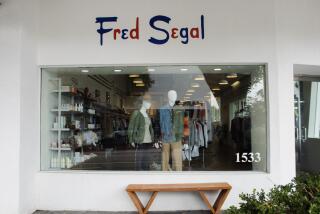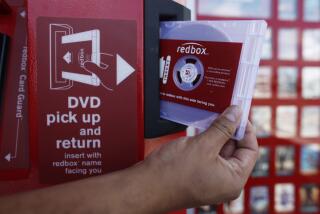‘Why are you still here?’ Inside the last Blockbuster in America
A man parked his motorcycle on the sidewalk Saturday morning, ruining the aesthetic of the last remaining Blockbuster in the continental United States.
“You can’t park there,” general manager Sandi Harding told the man as he walked into the store in Bend, Ore. “People are trying to take pictures.”
The man paused for a beat. There was confusion in his response.
“Trying to take pictures?”
Somehow he had missed the past decade, when Blockbuster the video rental behemoth became Blockbuster the fallen victim of modernity.
In 2004, at the company’s peak, 9,000 Blockbuster outlets studded city blocks and suburban strip malls nationwide, a onetime indelible fixture of the family movie night. But soon after, Netflix, Redbox and the cold march of digital progress eroded the customer base at each store.
By July 2018, thousands of Blockbuster stores were shut down, leaving only three: two in Alaska, and Harding’s store in Oregon.
“Every day, even before this, people would drive by and see the ‘Open’ sign and say, ‘Oh my gosh. How are you still here? Why are you still here?’” Harding said in a Saturday phone interview as her store buzzed with activity, including the arrival of the oblivious motorcyclist.
Now gawkers and tourists stop in Bend and line up to take photos in front of the store.
There is, in a literal sense, nothing quite like it in the continental United States.
And on Sunday, the stores in Alaska closed for the last time, making the Bend location the sole Blockbuster in the entire country.
Harding has been with the company for 14 years and joined the Bend location on Revere in May 2005. She insisted that nothing big changed. Customer service keeps people coming back, and new titles, such as NBC’s current show “The Good Place,” are available for rent.
Even the IBM computers are running the same floppy disks from the 1990s, she said, shocking the younger employees.
“No one can hack these computers, so that’s a good thing,” she said.
But Harding conceded that the internet and streaming services forever changed the way people consume entertainment, describing a “curve” from when Redbox and Netflix began to deliver more options.
It has been quite the fall from movie rental primacy. In 1989, a Blockbuster store opened every 17 hours. In the late 2000s, it seemed stores closed at that same pace.
Just a handful survived in the last few years after Dish Network bought the company in 2011 and dismantled remaining locations.
And yet, some stores persevered. Harding said many of her customers have been loyal for years.
Others come in for the nostalgic stroll between aisles, picking feverishly through the inventory to find an obscure film. And snagging the last copy of a new and popular release provides a small thrill they cannot get from a download button.
It was no coincidence that two of the remaining three Blockbuster stores were in Alaska. An older population, long and dark winters and unusually high internet usage fees conspired for the rental store business model to thrive there as it died elsewhere.
For a time, anyway. The stores in Alaska announced their closures Thursday.
“It is sad to say goodbye to our dedicated customers. We have thought of you as family for the past 28 years,” Kevin Daymude, the general manager of Blockbuster Alaska, said on Facebook. In a follow-up video on the page, two people dressed in black place a candle in a store parking space.
Even John Oliver could not save the Anchorage location. The host of HBO’s “Last Week Tonight with John Oliver” sent a jockstrap worn by Russell Crowe in the 2005 film “Cinderella Man” to the store. It displayed the unique piece of memorabilia since May, the Associated Press reported.
Though some might view Blockbuster’s fate as comeuppance — a big chain that displaced small, family-owned stores, only to be destroyed by innovation — Harding sees her store as a mainstay of the Bend community.
Ken and Debbie Tisher are local owners, she said, and they pay a licensing fee to Dish Network to use the name. It is the local video store for many in Bend.
And, once in while, the Blockbuster is a godsend.
When Gene Wilder died in 2016, mourners took to Netflix and other streaming services to watch films such as “Blazing Saddles,” “Young Frankenstein” and “Charlie and the Chocolate Factory.”
No luck. Customers flooded the store and called to ask if Harding’s store had them in stock. Of course it did, Harding said.
Horton writes for the Washington Post.
More to Read
Inside the business of entertainment
The Wide Shot brings you news, analysis and insights on everything from streaming wars to production — and what it all means for the future.
You may occasionally receive promotional content from the Los Angeles Times.










